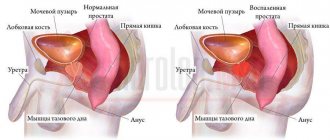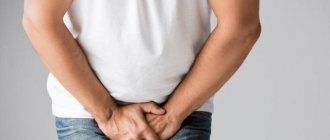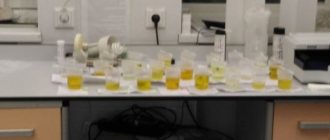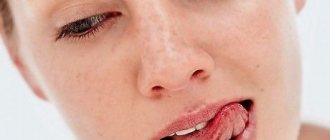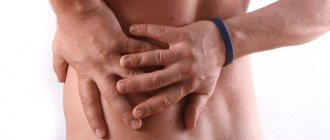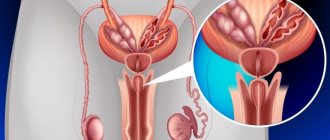No one is immune from pathologies of the genitourinary system, which often arise against the background of hypothermia, neglect of personal hygiene, various types of traumatic factors, etc. But even more often, male genitourinary pathologies arise as a result of infectious lesions, age-related changes or oncological processes. Most often, the main sign of such pathological processes is weak pressure during urination, difficulty or an overly frequent urge to urinate. What pathological processes are characterized by the presence of such a symptom?
Why does a violation occur?
Unpleasant urinary symptoms are found in many men; such problems especially often bother patients in the middle age group. With age, many disruptions and functional changes occur in the male genitourinary system, leading to the development of various kinds of pathologies and disorders.
Often the development of such disorders occurs in relatively young patients who are addicted to promiscuous sexual relations, which lead to the development of infectious prostatitis. In general, the prostate, closest to the urethra, is most often to blame for urinary problems. That is why, with the slightest changes in prostatic tissues or pathological infectious and inflammatory processes, compression of the urethra can occur, which will cause a weak stream during urination.
How and when the problem occurs
In older men, hormonal imbalance occurs, which leads to prostate adenoma. And as mentioned above, its increase makes it difficult for urine to pass through the canal. Pain occurs at the end of urination, and a man may observe a weak stream, which in advanced cases is so small that when urine is released it can be limited to a few drops. The consequences of tumor growth are difficult and require immediate attention to a doctor.
A weak stream of urine, which occurs due to a terrible reason - prostate cancer - can be detected in men of different ages. However, according to statistics, cancer is more often found in those over 50. The disease is difficult to treat, but this does not mean that everything should be left unattended and no action taken.
Prevention
The main task of preventing narrowing of the urinary channel is to minimize the danger from exposure to factors that contribute to the development of the corresponding diseases. There are few preventive measures, and they are not at all complicated, but their effectiveness depends on regular implementation. Such measures include:
- No self-medication.
- Protection during sexual intercourse.
- Protecting yourself from the penetration of foreign bodies into the urethra.
- Avoiding injuries to the urinary system.
Compliance with these rules will help reduce the likelihood of developing a double stream during urination and many other problems associated with men's health.
Diagnostics
Weak stream pressure during urination in men is the first signal that indicates the need to visit the hospital. You need to consult a specialized doctor - a urologist. This specialist is based on the treatment and diagnosis of renal and genitourinary disorders. Clear signs that you need to visit a hospital urologist:
- decline or complete absence of sexual desires;
- various pains occur when urinating, burning, tingling;
- the appearance of pain and tingling in the lumbar region.
There are different methods for diagnosing diseases, but the main thing for the patient is to pay attention to the symptoms. In an advanced stage, these symptoms can progress and cause male infertility. The doctor will prescribe you the appropriate medication sheet and give you recommendations for treatment. It is not advisable to engage in diagnosis and treatment using any traditional methods. Many of them are quite dubious and unverified. Self-medication can harm your body or simply be useless.
Several tests are used to diagnose and confirm diseases in the kidneys or bladder. This will help the doctor understand why the patient does not have pressure when urinating and how this can be corrected to prevent a recurrence in the future.
- Prostate ultrasound is one of the fundamental procedures for detecting malignant or benign prostate tumors. Ultrasound examination, combined with some other diagnostic measures, contributes to the timely detection of cancer cells in the human body.
- Computed tomography and ultrasound of the kidneys, as well as the genitourinary system in men, are necessary to detect stone formations. If they are detected, the size and position of these formations are determined. Also, similar diagnostic methods are used to localize changes in the structure of the prostate.
- Urofluometry. This method is one of the most specific. It determines the speed of pressure of the stream during the outflow of urine, measures the pressure, the final volume of urine, as well as the time it takes to empty the bladder. This information will help to better identify a specific disease, as well as understand at what stage of progression it is now.
- Urethroscopy. This method is one of the most unpleasant and discomforting. Urethroscopy uses an instrument that penetrates directly into the entire length of the urethral canal. This diagnostic measure allows you to immediately view the integrity of the canal and promptly detect stone deposits and swelling of the internal reproductive system.
- Blood and urine test (general) - if you have a weak stream when urinating, which is accompanied by painful sensations, and you go to the hospital, then your treatment and diagnosis will begin with a blood and urine test. This will help detect various inflammatory processes in the human body, and especially in the organs of the reproductive system.
- Smear. This diagnostic method is also called bacteriological culture. A certain part of the microflora is taken from the urethra and subjected to various medical studies. This allows you to detect pathogens in the microflora, as well as test how it will react to various antibiotics.
It is very important for the patient to undergo a set of diagnostic procedures, because they will help determine the treatment method. Based on this, the patient is prescribed certain medications.
Diagnostic measures begin with interviewing the patient:
- whether body temperature rises;
- is there pain when emptying the bladder;
- Do you have difficulty urinating while sitting?
- if after urination drops of urine are released, check whether this is accompanied by a stinging or burning sensation;
- Are there any pathological impurities in the urine?
Laboratory research methods include general clinical tests of urine and blood.
Laboratory research methods include general clinical tests of urine and blood, urine culture for sterility.
Instrumental methods provide insight into the anatomical and functional disorders of the urinary system. The most common are:
- Ultrasound of the bladder, kidneys, prostate.
- X-ray examination or computed tomography of the urinary system.
- Cystoscopy of the urethra.
- Examination of the prostate gland through the anus.
These studies are highly informative and are carried out without pain for the patient.
If you complain of painful and weak urination, you should make an appointment with a therapist or urologist. Treatment of difficulty urinating in men has good results if prompt medical attention is sought.
Men are not so willing to visit hospitals for diagnosis and treatment, however, the prospect of losing sexual function and developing prostate cancer should alert everyone. As soon as changes in urination occur, you need to visit a therapist or urologist, the following tests will be prescribed:
- General blood analysis. Allows you to determine the level of red blood cells, leukocytes, platelets, hemoglobin, etc., which will indicate the presence of an inflammatory process.
- A blood test to check for prostate-specific antigen or cancer marker.
- Ultrasound of the genitourinary system. It will show the condition of the tissues of the pelvic organs.
- Urine analysis for bacterial culture. Detects the presence of an inflammatory process and identifies the infectious pathogen.
- Palpation. Assessment of the size and location of the prostate gland.
- CT scan for suspected adenoma. Tomography will show a detailed condition of the gland, kidneys and urinary tract.
- Urethroscopy. Diagnosis using a thin cystoscope tube. Allows you to examine the cavity of the urethra, urinary bladder, see microtraumas, stones, neoplasms.
- Uroflowmetry. The analysis shows the speed at which urine passes through the ducts.
If a prostate mass or adenoma is detected, a biopsy is recommended to rule out cancer.
Symptoms of strangury
If difficulties arise with urination, the following manifestations are possible:
- Even with a full bladder, the stream is weak;
- Urine is released in drops, and auxiliary straining is required;
- The urine released is divided into two streams or sprayed in different directions;
- Before the process of urination begins, time is required to tense and tune in;
- The portion of urine excreted becomes significantly smaller;
- There may be a pronounced urge and absence of urination;
- Pain and discomfort when urinating.
The symptoms described above are not enough to confidently diagnose a disease such as stranguria. The presence of such symptoms indicates probable health problems, therefore, before making any conclusions, you need to consult a specialist.
What diseases does weak urine pressure indicate?
So, the main reasons for the weakening of the stream are pathologies of the prostate gland such as prostatitis, malignant and benign prostate tumors, etc. For a complete picture of urination disorders, the most complete overview of these diseases is necessary.
Prostatitis
Often the cause of weak urine pressure is prostatitis. This pathology is most often found in patients of average 30-45 years of age and is an inflammation of the prostate tissue. In general, the prostate gland is such an important organ that it is often called the second male heart. Experts believe that prostatitis develops as a result of prostatic congestion and pelvic infections. The following reasons can provoke stagnation or an infectious process in the prostate gland:
- Sexual infections transmitted through unprotected sex such as gonorrhea, trichomoniasis, chlamydia, etc.;
- Hypothermia caused by winter sports or exposure to a draft;
- Infectious processes in the genitourinary system such as pyelonephritis, cystitis, etc.;
- Inactivity, work associated with constant sitting, insufficiently active life;
- Reduced immune defense, as a result of which the body cannot overcome an infectious attack;
- Violent and intense sex life;
- Lack of regularity in sex, frequent periods of sexual abstinence;
- Traumatic injuries to the perineal area;
- Unhealthy habits and diet also negatively affect men's health.
In addition, frequent stress, hormonal imbalance, frequent constipation, congenital structural abnormalities of the prostate, etc. can trigger prostatitis.
Prostatitis is characterized by the presence of manifestations such as frequent painful urination, pain syndrome affecting the anal area, groin, sacrum and perineum, problems with potency, hyperthermia, hypersweating and a weak stream of urine. With advanced prostatic inflammation, the listed symptoms are supplemented by discharge from the urethra, lack of orgasmic sensations, a constant feeling of bladder fullness, etc.
BPH
Problems with urination in the form of a weak stream often occur with adenoma. This pathology occurs mainly in mature 40-50 year old men. The pathology is characterized by benign hyperplastic enlargement of prostatic tissue. Over the years, the size of the prostate gland gradually increases. A man, as a rule, does not notice this, because these processes are asymptomatic. As a result of such growth, the urethra becomes overloaded, which disrupts the normal processes of urinary outflow. As a result, pain symptoms appear and urine pressure weakens.
Symptoms are often supplemented by intermittent urination, a feeling of incomplete emptying, and dripping urine at the end of urination. Sometimes a man needs to tense his abs in order to urinate properly. When an adenoma is advanced, chronic renal failure, urine retention, urolithiasis, etc. may develop. Therefore, timely treatment is necessary.
Prostate cancer
The most dangerous cause of decreased urine pressure is prostate cancer. According to statistics, such a malignant cancer is found in every seventh man. The clinical picture of prostatic cancer has much in common with benign hyperplasia, which often leads to delayed referral to specialists.
Prostatic malignant oncology is characterized by polyetiological origin. The causes of such a malignant disease have not yet been definitively determined, however, experts name a number of factors provoking the pathology, such as old age and DNA changes in prostatic cells, heredity, etc.
Prostate cancer, in addition to weak urine pressure, is accompanied by other pronounced manifestations:
- Frequent trips to the toilet;
- Interruptions of the stream and its weakening;
- Residual urine syndrome;
- Frequent urge to urinate;
- Burning and cutting pain when defecating as needed.
Similar symptoms are often observed with benign growth of the prostate gland, i.e. prostate adenoma.
What kind of urination should be normal in men?
Strangury is the name of this pathology in men, and the causes and symptoms of this disease can be very different.
Violation of the outflow of urine indicates pathological processes in the body. To accurately determine the development of the disease, it is necessary to know what type of urination is considered normal.
The frequency and quantity of urination in an adult man depends on the characteristics of the body and is individual in nature. However, a certain norm still exists. A healthy man should urinate on average 4-7 times a day.
Going to the toilet once at night is also not considered a pathology. But if the urge to urinate occurs several times a night, and more than 7 times a day, then this is a direct indication of the development of the disease.
The speed of urination also has a strictly defined norm, which is about 15 ml/sec, no less. During the day, a healthy man should excrete approximately 1.5 liters of urine. This indicator directly depends on the amount of fluid drunk, body temperature, and blood pressure.
Taking diuretics, alcohol, coffee or green tea, significantly increases the daily urine output.
Normally, a man does not urinate for more than 20 seconds, and the pressure of the stream should be strong and continuous. The stream of urine should be elastic and follow a fairly wide arc. A weak, slow, intermittent stream or it bifurcates is a sign of pathology.
In certain diseases, at the end of urination, a man experiences a feeling of a full, not completely emptied bladder.
Infections as a cause of disorders
In most cases, the inflammatory process begins after infection with various types of bacteria. They multiply quickly in a humid environment and infect the prostate gland. If the disease is asymptomatic, the patient notices the problem by a change in the nature of the outflow of urine. The main routes of entry of the pathogen:
- Sexual contact with an infected partner, visiting a public pool, sauna or toilet, using a towel or washcloth after an ill family member.
- Backflow of urine from the bladder into the ureter, its stagnation. Pathogens manage to penetrate the genital tract and affect the mucous membranes of internal organs. The variant is typical for purulent tonsillitis, tonsillitis and other diseases that infect the kidneys.
Most often, inflammation is caused by bacteria Pseudomonas aeruginosa, Staphylococcus aureus and candidal fungi. Swelling also appears with sexually transmitted diseases, the activity of gonococci, mycoplasma and chlamydia. The main symptoms of an infectious lesion are characterized by intermittent urination in men, as well as:
- sharp cutting pain;
- frequent urge to defecate;
- heaviness in the lower abdomen;
- showing in the pubic area, in the anus;
- the appearance of a large amount of mucus that comes out when visiting the toilet.
Treatment depends on the type of pathogen. In most cases, the urologist selects an antibiotic and recommends medications to relieve swelling and inflammation. In an advanced state, infections can provoke problems in intimate life, causing incurable infertility and early impotence.
Treatment of weak urination in men
Treatment of weak urination in men is determined by the specific disease that is diagnosed in the patient. Medical specialists use conservative therapy - they prescribe medications in different dosage forms - tablets, suppositories, capsules. In some cases, surgical intervention is required, for example, when a tumor or cyst forms.
For information, the treatment tactics for low urine pressure are determined by the results of tests and studies. The patient is recommended to donate blood for general and biochemical examination, urine; examine a smear from the urethra; An ultrasound of the internal organs in the pelvis is performed.
Features of drug treatment depending on the disease:
Appointment with a urologist: preparation for examination, diagnosis and treatment measures
- Urolithiasis is treated with appropriate medications; additionally, physiotherapeutic procedures are prescribed to help dissolve and remove stones from the body.
- For prostatitis, anti-inflammatory and antibacterial medications are prescribed if the etiology is infectious. Massaging the prostate gland and hormonal therapy may also be recommended.
- Stricture of the urethral canal in 90% of clinical pictures requires surgical intervention endoscopically.
- Prostatic hyperplasia is treated with medications, physiotherapeutic procedures, prostate massage, diet therapy, and special gymnastics. In severe cases, surgery is performed.
- Cancer of the glandular organ requires surgery. Additionally, chemotherapy and radiation treatment are prescribed.
All medications are prescribed individually. The course of treatment is determined depending on the severity of symptoms, health status and other factors. Self-medication is not recommended, as it can cause serious complications.
Folk remedies
When the pathogenesis of weak urine pressure in men is based on muscle spasm, it is not forbidden to use methods of alternative medicine. Ideally, before use, it is recommended to consult with a medical specialist regarding the advisability of such treatment.
Effective folk remedies:
- Add 4 tablespoons of chopped rose hips to 1000 ml of hot water. Leave for three hours. Take 200 ml up to five times a day. This infusion has an anti-inflammatory effect, helps improve immune status, and has a positive effect on the body as a whole;
- A tincture based on tea rose fruits helps normalize the process of urination. To prepare, you will need to pour 50 g of the component with boiling water in a volume of 500 ml, leave for several days. When the homemade “medicine” turns yellowish, you can take it. Take 50 ml three times a day. Duration of treatment – until the negative symptoms are eliminated;
- Pour 1000 ml of hot water over birch leaves (30 g). Then put in a water bath and simmer for half an hour. Allow to cool naturally. Add a little linden honey or granulated sugar to taste. Store in a cool place. Take 30 ml four times a day.
Note: rowan berry decoction helps to get rid of intermittent urination - add 100 g of fresh or dried fruits, 10 g of ground leaves to a liter of boiling water, leave for 5 hours. Take 200 ml three times a day. The course of treatment is two weeks, after a week's break, repeat at the same dosage.
How to treat?
Under no circumstances should you treat yourself or select medications on your own.
Medicines should be prescribed by a doctor after diagnosis. The treatment regimen is selected individually in each case, and includes medications, physical therapy, and adherence to a certain diet.
The main medications are:
- antibiotics used for severe inflammatory processes (Ceftriaxone, Josamycin, Doxycycline);
- anticholinergic drugs that eliminate spasms of the bladder and urethra (Bantin, Oxybutynin, Proantin);
- anti-inflammatory drugs and analgesics, agents that slow down the growth of prostate adenoma.
Surgery may be required when diagnosing malignant tumors. It includes complete or partial removal of the prostate gland, endoscopic removal of tumors in the urethra, lithotripsy, used to destroy and remove stones in the kidneys and bladder.
Read our article on how to get rid of kidney stones using ultrasound.
Folk remedies
In combination with medications, you can also use folk recipes that improve the process of urination. The most popular are herbal decoctions and infusions.
For example, a decoction of the root of radiola rosea, which is very simple to prepare. It is enough to take a spoon (tablespoon) of crushed root, pour a glass of boiling water and boil for 15 minutes, strain and take twice, half a glass.
Another good remedy is celandine juice mixed with the same amount of alcohol. The finished infusion is diluted with 50 ml of water, and it is started with one drop per day, gradually (one at a time) increasing the dose to 30 drops. After which, the process occurs in reverse order, up to 1 drop per day.
Excellent results are obtained by infusion of wheatgrass, prepared by pouring and infusing the roots of this plant in cold water. After 10 hours, when the roots are well swollen, they are poured with boiling water (1.5 l) and left for an hour in a warm place. Then, the medicine is taken three times, 100 ml each.
Beekeeping products help with difficulty urinating: honey, propolis, pollen. Often, doctors recommend drinking carrot, beet or cucumber juice, garlic infusion, or a decoction of parsley seeds.
Any of these methods is effective and safe, but before using them, it is better to consult with your doctor. Indeed, with certain concomitant diseases (allergies, diabetes), folk remedies can cause complications.
The doctor will tell you how to deal with difficulty urinating due to prostate adenoma in the video:
Traditional methods of treatment
There are many folk methods for treating certain diseases and disorders of the human body, accompanied by a split stream during urination in men. In this case, therapy with medicinal herbs is very suitable, among which black currant, bearberry, juniper and lingonberry have a special effect on this problem. The use of hirudotherapy is also encouraged, but it should be carried out under the supervision of a specialist.
Important! Before starting treatment with folk remedies, you should consult your doctor. Not all medicines and traditional methods are compatible with each other; in some cases, their combined use can lead to harmful consequences for the body.
Why is this dangerous and a symptom, what diseases can it be?
The presented pathology is characterized by the presence of the following symptoms:
- Sluggish urination, directed in different directions.
- Discharge in the form of drops, not streams.
- Splitting jets with splashing.
- Long wait for initial allocation.
It is worth noting that the presence of such symptoms should already alert the patient and force him to contact a professional.
Moreover, you should refuse to make an independent diagnosis and treatment. This is explained by the fact that it is possible to select low-quality therapy, and as a result, only worsen the course of the disease. Urologists are knowledgeable about this problem and can easily determine the cause of the pathology based on symptoms and test results.
Treatment and Prevention Options
The therapeutic approach is based on the reason that provoked the decrease in urinary pressure. If the cause lies in prostatitis, then the use of anti-inflammatory therapy, prostatic massage, hormonal treatment, antibiotic drugs in the form of rectal suppositories, etc. is indicated. In this case, the list of prescribed drugs is determined by the form of prostatitis (bacterial, etc.).
Prostate adenoma is treated through complex measures such as medications, physiotherapy, exercise therapy, diet therapy and massage. In particularly difficult cases of pathology, surgical intervention is resorted to. If the causes lie in prostatic cancer, then hormonal therapy, chemotherapy and radiotherapy, medications and treatment with monoclonal antibodies, virotherapy or surgery are used. If a man consults a urologist in a timely manner, he has every chance of successfully getting rid of prostatic cancer.
Treatment recommendations
Treatment is selected after diagnosis and examination of the patient's medical history. Depending on the pathology, it may consist of the following parts:
- drug therapy aimed at stopping the growth of adenoma tissue;
- surgery to remove part of the adenoma or prostate cancer;
- antibacterial therapy when infectious inflammation is detected;
- anti-inflammatory drug therapy;
- drug therapy aimed at dissolving stones;
- microsurgery to remove kidney and bladder stones;
- endoscopic intervention to excise the area where the narrowing of the urethra occurred.
With self-treatment or an incorrect diagnosis, the symptoms can be eliminated, but the root cause will remain and will only increase in scale.
In the treatment of weak urination, the first priority is to eliminate painful symptoms, then the fight is directed against the main cause of impaired urinary flow and eliminating the development of infection.
After undergoing therapy or surgery, the patient’s condition is monitored for some time to assess the effectiveness of treatment and exclude relapse.
To eliminate the main complaint of weak urination, anticholinergic drugs are prescribed. Their action is aimed at reducing tension in the smooth muscles of the bladder. You can remove the spasm with the drugs Spazgan, Spazmalgon, Baralgin.
The most common antibiotics for treating the urinary system:
- Amoxiclav;
- Amoxicillin;
- Clarithromycin;
- cephalosporin antibiotics.
To help the body quickly cope with the disease, drugs are prescribed to enhance immunity. Echinacea tincture and Immunal have a natural composition. Complex preparations will help restore the level of vitamins and microelements: Vitrum, Complivit, Selmevit.
Alternative treatment is allowed only to enhance the therapeutic effect or during rehabilitation. The stamen orthosiphon or bear's ears have beneficial properties for the genitourinary system; infusions and decoctions are made from them.
To eliminate the main complaint of weak urination, anticholinergic drugs are prescribed. Their action is aimed at reducing tension in the smooth muscles of the bladder. You can remove the spasm with the drugs Spazgan, Spazmalgon, Baralgin.
Alternative treatment is allowed only to enhance the therapeutic effect or during rehabilitation. The stamen orthosiphon or bear's ears have beneficial properties for the genitourinary system; infusions and decoctions are made from them.
Over the years, men are increasingly susceptible to the development of prostatic pathologies, however, with the right approach, the risk of such diseases can be significantly reduced. First, it is necessary to eradicate all harmful habits such as smoking, alcohol abuse, etc. It has been proven that carcinogens and tars contained in cigarette smoke can partially accumulate in the prostate, which often leads to the development of tumor processes of varying degrees of malignancy.
An important point is the rhythm of sexual life. Moderate sexual activity will have a beneficial effect on the condition of the prostate. It is also necessary to reconsider the diet, which must be enriched with microelements, vitamins and other necessary substances that are beneficial for men. Then prostatic pathologies will not affect you for a long time.
Norm
What stream of urine is considered normal? Normally, the process of urination does not cause a person any discomfort or difficulty. The stream of urine should be wide and fast, flow out on its own and not require straining. The elimination process should not be intermittent, painful, and after completing urination, the person feels relief and a completely emptied bladder.
The next urge to visit the toilet occurs after 1-2 hours, depending on the person’s drinking regime and nutrition.
However, it is difficult to talk about urination disorders based on general characteristics, because each organism has its own individuality and structural features. Also, urine pressure depends on a person’s ability to visit the toilet on time.
Preventive actions
Prevention of weak urination in the stronger sex is based on the prevention of diseases that are manifested by this symptom. The basis is a healthy lifestyle.
Preventive measures include the following points:
- Sports activities - running, walking, swimming. It is recommended to perform special gymnastics at home, which is aimed at increasing tone.
- Proper nutrition - give up alcohol, fatty and high-calorie foods, reduce the consumption of granulated sugar and table salt. The menu includes a large amount of food that contains plant fiber.
- To give up smoking. Practice shows that a man who smokes 10 cigarettes a day cannot be healthy by definition.
- Normalization of emotional state. Of course, it is impossible to eliminate stress from life, but it is quite possible to change your attitude towards life’s troubles. Constant worries, neuroses and depression do not improve your health.
- Regular sex life. Sex is a good prevention of congestion in the pelvis, which leads to prostatitis and other diseases. When having casual sex, always use condoms to prevent contracting sexually transmitted diseases.
Weak urine pressure is a symptom of many diseases. If you have this symptom, you should immediately visit a medical specialist. Timely diagnosis and subsequent treatment will help prevent serious complications in the near future.
One of the initial signs of a painful urinary system is weak urine pressure. According to statistics, every third person has a kidney problem and many diseases develop on this basis. There are often cases when the primary symptom progresses into a chronic illness that causes a lot of inconvenience.
In order not to think about such a problem as difficulty urinating, you just need to follow simple rules in everyday life:
- Active lifestyle. Increases immunity, strengthens blood vessels, disperses congestion. Having a sedentary job, every hour you need to get up and do a short warm-up with squats. In adulthood, it is recommended to perform a prostate training complex.
- To refuse from bad habits.
- Proper nutrition. You need to choose homemade food products without preservatives. The diet should not contain fried, fatty, salty, spicy, smoked foods. Eat more fresh vegetables and herbs.
- Regular sex life, no less important - protected.
- Preventive examination by a urologist once every six months.
- Avoid stressful situations.
- Avoid hypothermia.
We suggest you familiarize yourself with Enalapril affects potency in men
You can protect men's health and protect yourself from a burst bladder by following a few simple rules. Their implementation is necessary not only after an illness, but also in the absence of any complaints.
Preventing the development of pathology is always much safer and, importantly, cheaper than treating certain ailments, while worrying about preserving your own reproductive function.
Weak urine pressure in men will become irrelevant if:
- lead an active lifestyle - play sports, move a lot, perform special exercises aimed at increasing body tone;
- eat right - exclude fatty and spicy foods, give preference to natural products, including those of plant origin;
- give up bad habits - a person who drinks alcohol in significant quantities and constantly smokes cannot be healthy by definition;
- remain calm - stress, nervous disorders, depression have an extremely negative effect on the immune system, which is why the risk of all kinds of diseases increases significantly;
- have a regular sex life - sex helps get rid of stagnant processes. At the same time, it is very important to choose a sexual partner wisely. It is desirable that it be one and constant;
- Visit your doctor regularly—several examinations a year with a urologist are enough to promptly identify various pathological processes that may occur in the genitourinary system.
A man's health depends on himself. If you notice problems associated with weak urination, you should seek help from the hospital.
Therapy
Self-diagnosis and self-medication at home often only aggravate the situation and do not bring the desired result. An illiterate approach to treatment can cause severance of nerve pathway connections. Perhaps the only correct independent decision will be dietary nutrition. It will be necessary to exclude fried, spicy, smoked, confectionery, alcohol, tea and coffee from the patient’s diet for a period of fifteen to twenty days.
After the cause of stranguria has been accurately established, the specialist will prescribe therapy. In the case of inflammatory diseases, treatment of strangury in women and men is accompanied by the use of antibiotics and antiviral drugs. If there is an infectious disease that is sexually transmitted, taking medications is synchronized with the necessary studies.
Anthropine-like medications are used to relieve muscle spasms in the urinary tract area. There are many such drugs that can be used both orally and rectally in the form of suppositories. The condition of the heart should be monitored, in particular in people of the third age. If side effects occur, you should consult your doctor.
Private reasons
Let us consider in more detail the causes of various diseases of the genitourinary tract.
Urethral stricture often occurs due to the following reasons:
- receiving injuries or burns to the urinary canal;
- inflammation of the inner part of the urethra, bladder, ureters and other organs of the renal and urinary system;
- problems or instability of blood circulation in the internal tissues of the urinary organs;
- illiterate or unsuccessful operations of urologists.
- If the patient has previously had or still has any urological diseases, for example, chlamydia or ureoplasmosis.
- Regular hypothermia of the body. In this case, both general hypothermia of the body and freezing of individual parts or organs negatively affect the body.
- Disease of the renal system, ureters, bladder in the chronic or acute stage.
- An inactive lifestyle, sedentary work and lack of even light physical activity, which leads to weakened immunity.
- Decreased immunity due to stressful situations, colds, unstable sleep, etc.
- Hormonal imbalance (imbalance).
Another common disease is prostatitis. Inflammation forms in the internal tissues of the prostate gland.
The following factors are auxiliary and provoke the development of chronic prostatitis:
A long stay in a stressful environment, as well as the presence of genetic or congenital pathologies of the prostate gland, significantly contributes to the formation of the disease. With prostatitis, not only does pain appear when passing urine, but also the overall body temperature rises, unusual sweating and a feeling of fatigue appear.
Urolithiasis disease
The formation of stones in the urinary system due to metabolic disorders. Causes pain in the lower back or lower abdomen, aggravated by physical activity and sudden movements. If the stones descend, the pain spreads to the head of the penis, testicles, and groin. Nausea and vomiting occur. Damage to blood vessels is accompanied by bleeding. Small stones may pass on their own. Some types of them dissolve under the influence of special preparations. But in most cases surgery is required.
Why is there a weak stream in women?
Women experience weak flow just as often as men. This syndrome is called stranguria, difficulty in deurination. The symptoms are exactly the same as in the male sex, and also require careful treatment of the cause. The reasons for the appearance of strangury in the fair sex are considered to be the following:
| № | Helpful information |
| 1 | injury to urine excretion pathways. This can be due to the passage of sand or stones through the ducts, a failure in the innervation of the urethral canal, as well as tumors in any of the organs of the genitourinary system |
| 2 | diseases of the urological sphere. Cystitis and any form of pyelonephritis, urethritis and other inflammations |
- sexually transmitted diseases that change the structure of the urethra in the female body;
- pregnancy, especially in the first and third trimesters. The uterus squeezes the bladder so that there is a constant urge even in the absence of fluid in the organ;
- changes in a woman's hormonal levels. There is a change in the surfaces in the bladder, which is especially pronounced during menopause or menstruation;
- injuries of the spine, peritoneum, and also after sexual intercourse.
Causes of double stream when urinating
There are many reasons that lead to separation of the stream during urination. Some of these causes are very common and there is no need to worry about them, but others may be the result of a serious medical condition and require urgent medical attention.
Let's start with the most common causes of double urine flow.
Ejaculation
Many men experience this effect several hours after ejaculation. This is perhaps one of the most common causes of this condition. How does this happen? During ejaculation, sperm is expelled through the male urethra. When sperm passes through the urethra, some of it sticks to the walls of the canal and dries there. Since urine passes through the same urethra, dried semen interferes with the movement of the fluid, dividing it into two or more parts. This is the reason that many people notice a double stream not immediately after intercourse, but several hours after ejaculation. This condition is not permanent.
To avoid this, it is recommended to urinate once after ejaculation so that the urine will wash away the stuck sperm from the urethra.
Low urine pressure
When the urine pressure is not high enough, the urine flow can easily split. This is another common reason for a split stream during urination. Many people notice this only when urine pressure is low during bowel movements. In this case, any obstruction (it could be dried seminal fluid, or some kind of thread from underwear) or minor obstruction of the urethra can contribute to the separation of the stream. And if the urine pressure is strong enough, it will simply push out the obstacle, and there will be no separation of urine.
Neurological disorders
The contraction of the bladder walls is regulated by the exchange of signals between their receptors and the central nervous system. With damage to the spinal cord, severe osteochondrosis, multiple sclerosis, or physical damage to the nerve pathways, signal transmission is interrupted or distorted. Such disorders cause obstruction of the urinary tract indirectly. Nervous pathology itself does not create an obstacle to the outflow of urine, but it does affect the tone of the bladder. The sluggishness of its walls leads to the accumulation of urine, slowing down its emptying. In some cases, it flows without pressure at all.
The cause of a neurological urinary disorder can be genital herpes, which lives in the nerve ganglia.
What to do?
If the stage of the disease that caused the bifurcation of the urine stream is initial, then many specialists prescribe antibacterial drugs to their patients in combination with urological drugs and a vitamin complex.
X-rays of the upper urinary tract are also mandatory. Quite often this is enough to determine the course of treatment for the patient. If the situation does not look so good, then additional laboratory research will be necessary.

